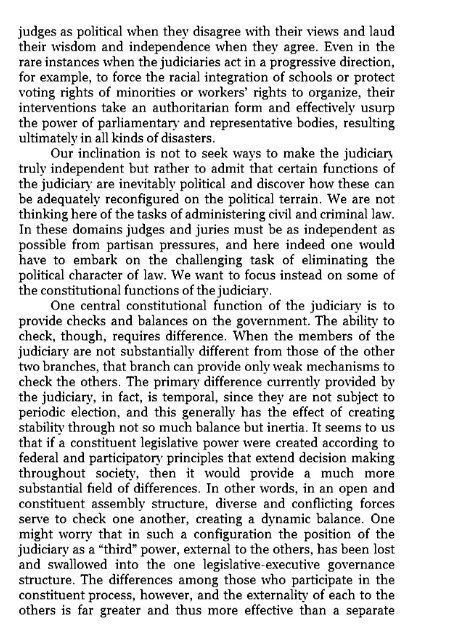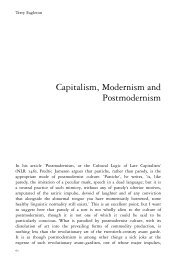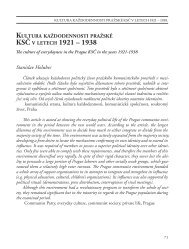Chapter 1: Subjective Figures of the Crisis ... - Negri in English
Chapter 1: Subjective Figures of the Crisis ... - Negri in English
Chapter 1: Subjective Figures of the Crisis ... - Negri in English
You also want an ePaper? Increase the reach of your titles
YUMPU automatically turns print PDFs into web optimized ePapers that Google loves.
judges as political when <strong>the</strong>y disagree with <strong>the</strong>ir views and laud<br />
<strong>the</strong>ir wisdom and <strong>in</strong>dependence when <strong>the</strong>y agree. Even <strong>in</strong> <strong>the</strong><br />
rare <strong>in</strong>stances when <strong>the</strong> judiciaries act <strong>in</strong> a progressive direction,<br />
for example, to force <strong>the</strong> racial <strong>in</strong>tegration <strong>of</strong> schools or protect<br />
vot<strong>in</strong>g rights <strong>of</strong> m<strong>in</strong>orities or workers' rights to organize, <strong>the</strong>ir<br />
<strong>in</strong>terventions take an authoritarian form and effectively usurp<br />
<strong>the</strong> power <strong>of</strong> parliamentary' and representative bodies, result<strong>in</strong>g<br />
ultimately <strong>in</strong> all k<strong>in</strong>ds <strong>of</strong> disasters.<br />
Our <strong>in</strong>cl<strong>in</strong>ation is not to seek ways to make <strong>the</strong> judiciary'<br />
truly <strong>in</strong>dependent but ra<strong>the</strong>r to admit that certa<strong>in</strong> functions <strong>of</strong><br />
<strong>the</strong> judiciary' are <strong>in</strong>evitably political and discover how <strong>the</strong>se can<br />
be adequately reconfigured on <strong>the</strong> political terra<strong>in</strong>. We are not<br />
th<strong>in</strong>k<strong>in</strong>g here <strong>of</strong> <strong>the</strong> tasks <strong>of</strong> adm<strong>in</strong>ister<strong>in</strong>g civil and crim<strong>in</strong>al law.<br />
In <strong>the</strong>se doma<strong>in</strong>s judges and juries must be as <strong>in</strong>dependent as<br />
possible from partisan pressures, and here <strong>in</strong>deed one would<br />
have to embark on <strong>the</strong> challeng<strong>in</strong>g task <strong>of</strong> elim<strong>in</strong>at<strong>in</strong>g <strong>the</strong><br />
political character <strong>of</strong> law. We want to focus <strong>in</strong>stead on some <strong>of</strong><br />
<strong>the</strong> constitutional functions <strong>of</strong> <strong>the</strong> judiciary.<br />
One central constitutional function <strong>of</strong> <strong>the</strong> judiciary is to<br />
provide checks and balances on <strong>the</strong> government. The ability to<br />
check, though, requires difference. When <strong>the</strong> members <strong>of</strong> <strong>the</strong><br />
judiciary are not substantially different from those <strong>of</strong> <strong>the</strong> o<strong>the</strong>r<br />
two branches, that branch can provide only weak mechanisms to<br />
check <strong>the</strong> o<strong>the</strong>rs. The primary difference currently provided by<br />
<strong>the</strong> judiciary, <strong>in</strong> fact, is temporal, s<strong>in</strong>ce <strong>the</strong>y are not subject to<br />
periodic election, and this generally has <strong>the</strong> effect <strong>of</strong> creat<strong>in</strong>g<br />
stability through not so much balance but <strong>in</strong>ertia. It seems to us<br />
that if a constituent legislative power were created accord<strong>in</strong>g to<br />
federal and participator}' pr<strong>in</strong>ciples that extend decision mak<strong>in</strong>g<br />
throughout society, <strong>the</strong>n it would provide a much more<br />
substantial field <strong>of</strong> differences. In o<strong>the</strong>r words, <strong>in</strong> an open and<br />
constituent assembly structure, diverse and conflict<strong>in</strong>g forces<br />
serve to check one ano<strong>the</strong>r, creat<strong>in</strong>g a dynamic balance. One<br />
might worry that <strong>in</strong> such a configuration <strong>the</strong> position <strong>of</strong> <strong>the</strong><br />
judiciary as a "third" power, external to <strong>the</strong> o<strong>the</strong>rs, has been lost<br />
and swallowed <strong>in</strong>to <strong>the</strong> one legislative-executive governance<br />
structure. The differences among those who participate <strong>in</strong> <strong>the</strong><br />
constituent process, however, and <strong>the</strong> externality <strong>of</strong> each to <strong>the</strong><br />
o<strong>the</strong>rs is far greater and thus more effective than a separate










